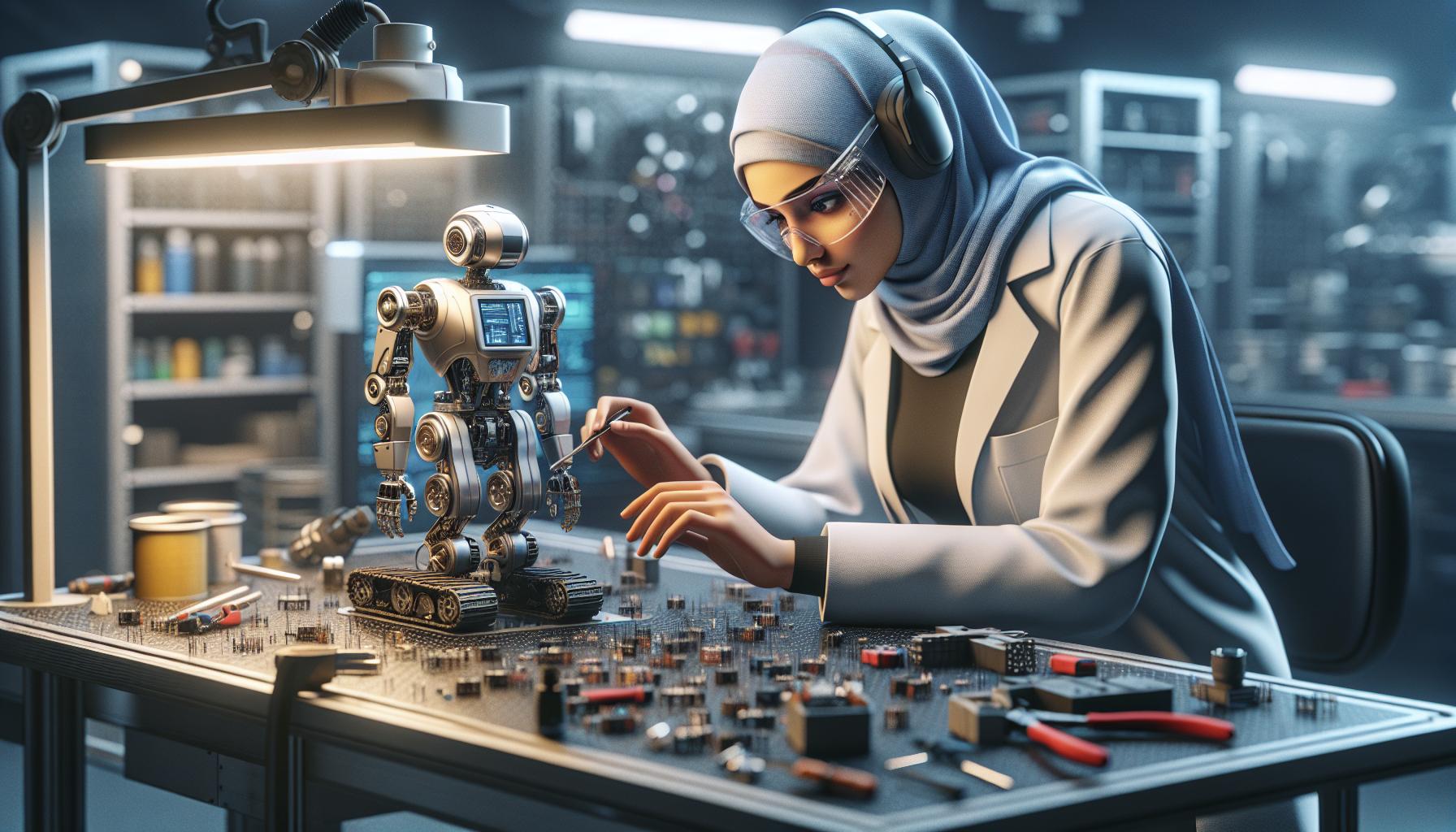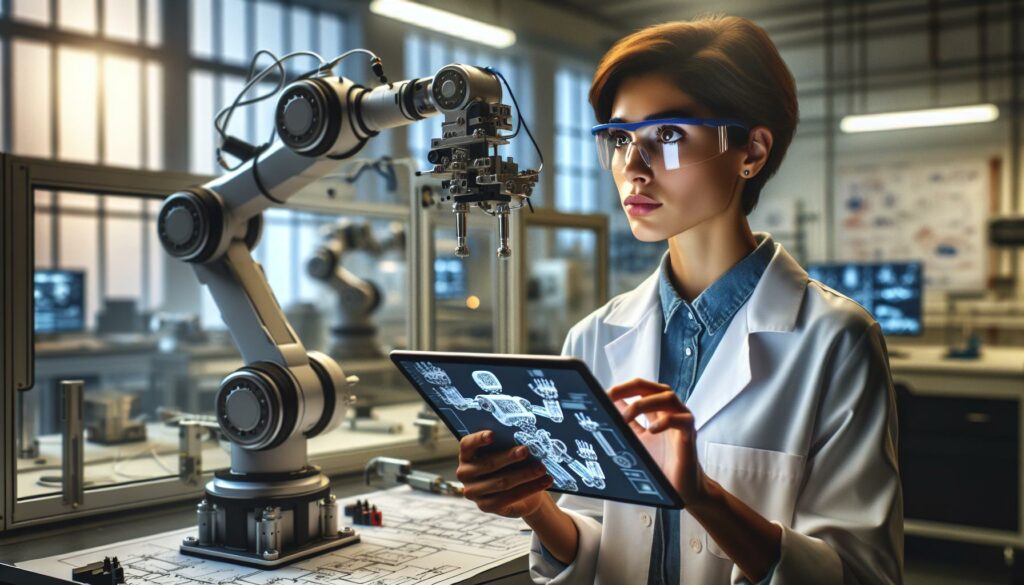When I think about the future, robotics engineers are at the forefront of innovation, crafting the technologies that shape our world. These professionals don’t just build robots; they design, develop, and test robotic systems that can revolutionize industries like healthcare, manufacturing, and even space exploration. Their work requires a blend of creativity and technical expertise, making them the architects of tomorrow’s solutions.
In a world increasingly reliant on automation, understanding what robotics engineers do is crucial. They tackle complex challenges, ensuring machines can perform tasks with precision and efficiency. From programming intricate algorithms to integrating cutting-edge sensors, their role is as dynamic as the technologies they create. By exploring the responsibilities and impact of robotics engineers, we gain insight into a field that’s driving progress and transforming how we live and work.
Key Takeaways
- Diverse Responsibilities: Robotics engineers design, develop, and test robotic systems, utilizing a blend of creativity and technical expertise to innovate across multiple industries, including healthcare, manufacturing, and aerospace.
- Technical Proficiency: Essential skills involve programming languages such as Python and C++, mechanical design software like AutoCAD, and a deep understanding of electronics and circuit integration to enhance robot functionality.
- Collaboration and Problem-Solving: Engineers frequently work in multidisciplinary teams and need strong problem-solving skills to tackle challenges ranging from software bugs to mechanical issues, ensuring efficient robotic operations.
- Key Industries: They play crucial roles in industries requiring precision and automation, notably driving advancements in manufacturing, healthcare, and defense sectors.
- Education and Skills: A strong educational background in robotics, mechanical engineering, or computer science is crucial, complemented by both technical and soft skills to foster innovation and successful project management.
- Challenges and Ethics: Robotics engineers face challenges such as complex systems integration, budget constraints, safety, and ethical considerations, which require continuous learning and ethical awareness to navigate effectively.
What Do Robotics Engineers Do
Robotics engineers design, develop, and test automated systems. They combine creativity and technical expertise to bring innovative solutions to various industries like healthcare and manufacturing. By utilizing software development, mechanical design, and electronics, engineers create machines that perform tasks traditionally done by humans.
In my role, I analyze project requirements and develop prototypes. Testing prototypes allows me to ensure performance and safety standards. I often collaborate with multidisciplinary teams, where team members share insights and technologies to enhance robotic functionalities.
Programming languages such as Python and C++ play a critical role. They enable the development of complex algorithms and control systems integrally important in robotics. Engineers frequently update software to improve efficiency and functionality.
Understanding industry-specific regulations is essential to maintain compliance. I adhere to these guidelines while designing machines to ensure they meet operational and safety requirements. Continuous research keeps engineers at the forefront of technological advancements.
Problem-solving skills are crucial. Engineers tackle challenges ranging from mechanical mishaps to software glitches. Quick and effective solutions minimize downtime and ensure smooth operations.
Robotics engineers significantly impact automation by creating advanced machines that revolutionize workflows and increase productivity in various sectors.
Key Responsibilities of Robotics Engineers

Robotics engineers play a crucial role in advancing technology by taking on various responsibilities. These professionals navigate complex challenges to develop state-of-the-art robotic systems.
Designing and Prototyping Robots
In designing robots, I focus on creating efficient and functional systems. My tasks include sketching mechanical layouts, selecting materials, and implementing innovative features. Prototyping provides an opportunity to test these designs in real-world applications, allowing for modifications and improvements before final production.
Programming and Coding
Programming forms the backbone of robot functionality. I write scripts primarily using languages like Python and C++ to develop algorithms that control robotic actions, responses, and interactions. This process involves integrating software with hardware components to ensure seamless operation.
Testing and Debugging
Testing ensures robot performance aligns with project goals. I conduct rigorous evaluations to identify and fix any mechanical or software glitches. Debugging is essential for resolving issues and optimizing robot functionality, minimizing downtime and improving reliability.
Collaboration with Multidisciplinary Teams
Working with multidisciplinary teams enhances robotic capabilities. Collaborating with experts from different fields, such as electronics, mechanical engineering, and AI, allows me to integrate diverse perspectives and expertise, leading to more robust and innovative robotic solutions.
Industries Where Robotics Engineers Thrive

Robotics engineers find themselves crucial in various industries that rely on precision, automation, and cutting-edge technology. Their expertise propels advancements in sectors ranging from manufacturing to aerospace.
Manufacturing and Automation
Robotics engineers revolutionize manufacturing, developing automation systems that improve efficiency and accuracy. They design robotic arms and conveyor systems used in assembling products like cars and electronics. A focus on increasing production speed and reducing errors keeps them at the forefront of manufacturing innovation. The integration of AI and machine learning allows adaptive robots to enhance performance, meeting the dynamic demands of the market.
Healthcare and Surgery
In healthcare, robotics engineers are pivotal in creating robotic surgical systems. These systems allow for minimally invasive procedures, reducing recovery time and improving patient outcomes. Engineers design and refine surgical robots like Da Vinci, focusing on precision and control. They also develop robotic assistants for rehabilitation and elder care, providing support and improving patient quality of life. Their work enables healthcare professionals to deliver safer and more effective treatments.
Aerospace and Defense
In aerospace and defense, robotics engineers contribute to the development of unmanned systems, including drones and autonomous vehicles. Their work enhances surveillance, reconnaissance, and combat capabilities. Engineers design robotics for satellite deployment and maintenance, where precision and reliability are critical. The industry benefits from their innovations in AI, enabling systems to operate in challenging environments, extending the reach and effectiveness of aerospace and defense operations.
Required Skills and Qualifications

Robotics engineers blend technical expertise with creative problem-solving to innovate and refine robotic systems, impacting various sectors.
Education and Training
A strong educational foundation is essential. Most robotics engineers earn a bachelor’s degree in fields like robotics engineering, mechanical engineering, or computer science. Advanced degrees in robotics and engineering fields increase specialization and job prospects. Courses in mathematics, physics, and computer programming form the core of their academic preparation.
Technical Skills
Technical skills define the capabilities of robotics engineers. Proficiency in programming languages like Python and C++ is crucial for developing and executing complex algorithms. Knowledge of mechanical design software, such as AutoCAD and SolidWorks, supports the creation of robotic frameworks and components. Familiarity with electronics and circuit design aids in integrating sensors and actuators, essential for robot functionality.
Soft Skills
Soft skills enhance collaboration and innovation. Strong problem-solving abilities address mechanical and software challenges, optimizing systems and minimizing errors. Effective communication skills enable seamless interaction with multidisciplinary teams, ensuring project alignment and improvements. Creativity fosters innovation, allowing the development of unique solutions and adaptive designs.
Challenges Faced by Robotics Engineers
Robotics engineers confront various challenges that demand expertise and adaptability. Rapid technological advancements often necessitate staying abreast with cutting-edge innovations. This ongoing evolution requires continuous learning to integrate new tools and approaches seamlessly.
Complex systems integration poses another significant challenge. Engineers must ensure that diverse components work harmoniously within robotic systems. Compatibility issues often arise during the integration of hardware and software elements, requiring meticulous attention to detail.
Cost constraints can impact project development. Engineers often operate within limited budgets, influencing decisions related to design, materials, and manufacturing. Balancing performance with affordability becomes crucial to meet project specifications while maintaining competitiveness.
Safety and ethical considerations are vital in engineering. Engineers must ensure that robots operate safely in environments shared with humans. Ethical concerns arise, particularly in fields like artificial intelligence and automation, where decision-making capabilities of robots can have substantial implications.
Troubleshooting and maintenance present ongoing issues. Engineers regularly address mechanical malfunctions and software bugs that can disrupt operations. Proactive maintenance strategies and robust problem-solving skills are necessary to ensure systems remain functional and efficient.

